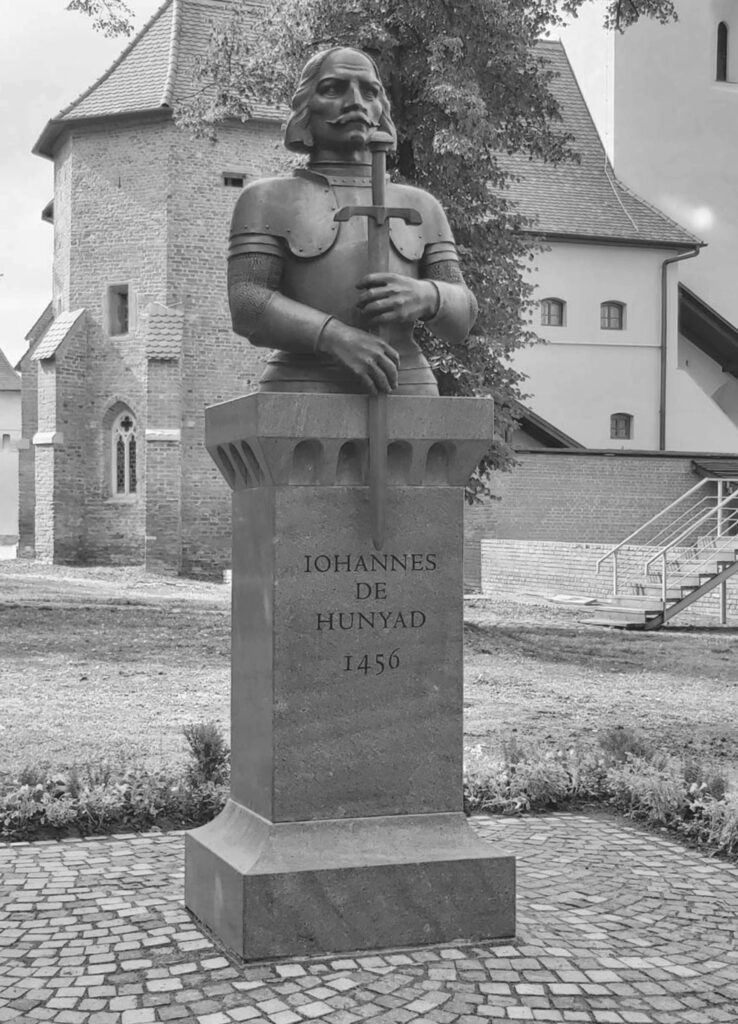Speech delivered at the inauguration of János Hunyadi’s statue in
Marosvásárhely (Târgu Mureș, Romania), on 30 July 2022
I would like to thank everyone who played a role in the creation and placement of János Hunyadi’s statue. They are the ones who made this day possible. And I believe that today’s event is a special one, for both Hungary and Romania, and indeed for all Europe. In particular, I wish to thank you for allowing me to be here, and while I am here—since I did not embark on this early-morning trip to repeat the words of those who spoke before me, and I think the most important remarks about the significance of János Hunyadi have already been said—I think it is best if I restrict myself to drawing some general conclusions.
János Hunyadi is a truly titanic, remarkable figure in our national history, and in the history of Europe. Without him, in all probability neither the Hungarians, nor the Romanians, nor the other nations of Europe would be the same as they are, because without his figure European history would have taken a very different course. This, above all, is why we are grateful to János Hunyadi. Historiographical debates about his origins will no doubt continue, but as far as I am concerned, the question is of limited importance, especially in this part of Europe. From a Hungarian point of view, I agree with the idea expressed by the poet Endre Ady, who said, ‘I extend my hand to thee / made Hungarian by reason, order, fate, will, and opportunity’. Many other great Hungarian poets, such as Attila József, could also be cited.
But let us turn briefly to the most salient lessons we may draw from János Hunyadi’s life and exploits. First and foremost, I believe the message of resistance, courage, and self-sacrifice is very important. If a vast foreign power threatens a nation’s existence, a decision must be made: do we compromise, submit, and adopt the conqueror’s language, customs, way of life, and religion, or do we resist? He chose to lead the fight, the resistance. And resistance carried within it a message of independence, both of the inner individual and the community, as well as freedom: the freedom of our language, our way of thinking, our culture, and most of all our religion. It is not by chance that I repeat the word ‘religion’, because at the centre of János Hunyadi’s life’s work was the defence of Christianity, the Christian faith,

and the Christian teaching, according to which God created man in his own image and people are all equal, possessing equal dignity, freedom, and responsibility. Of course, European culture, European identity, the European way of life, and the European historical heritage based on Judeo-Christian traditions cannot be avoided in connection with Christianity. This is what makes us European, and we have János Hunyadi to thank for this, too.
We may ask ourselves what would have happened if he had not been there, or had chosen not to fight, not to become a hero, not to end up on the positive side of history, on the side of heroes and martyrs. Well, we do not know what would have happened, and in any case, wise historians never ask such questions. But it is possible that we would not now see the domes and spires of cathedrals that, as the writer Sándor Márai put it, ‘link together the strongholds of European Christian culture’. We might not even see the crosses. Not on our roads, nor in our cemeteries, nor in our churches. We might not even hear the tolling of the bells. And I am not thinking only about the tolling of the bells at noon, commanded by Pope Callixtus III to celebrate János Hunyadi’s victory at the Battle of Nándorfehérvár (Belgrade) in July 1456, but the everyday tolling of the bell on holidays, funerals, and during periods of mourning, forming part of the framework of our lives. All this might have been lost. In short, we might not have been who we are. And we want to remain who we are. We want to see the crosses, and we want to hear the bells, not only the bells we hear at noon and at other times, but also the bells that ring inside us, as Sándor Csoóri wrote in his wonderful poem ‘Bells are ringing in me’.
Yes, these bells are ringing in us, and it is our job, our duty, to ensure that these bells toll not only now, but also in the future, as Hungarians, Romanians, Serbs, Croats, and Germans, just as they tolled in the hearts of all those many nationalities who fought together under the leadership of János Hunyadi, and still toll in all the other nations of Europe and Christendom, because we belong together. Our history, our traditions, our thoughts, our feelings, and our common religion all bind us together. I believe that today’s event is a very important one, not only for our two nations, but for the whole of Europe, and even the whole world, because the Christian religion is also universal, and we must never forget that.
